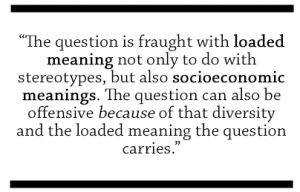 Stacy Whitman is Editorial Director and Publisher of Tu Books, an imprint of LEE & LOW BOOKS that publishes diverse science fiction and fantasy for middle grade and young adult readers. This blog post was originally posted at her blog, Stacy Whitman’s Grimoire.
Stacy Whitman is Editorial Director and Publisher of Tu Books, an imprint of LEE & LOW BOOKS that publishes diverse science fiction and fantasy for middle grade and young adult readers. This blog post was originally posted at her blog, Stacy Whitman’s Grimoire.
I recently got this question from a writer, who agreed that answering it on the blog would be useful:
My hero is a fifteen-year-old African American boy [in a science fiction story]. A few of my alpha readers (not all) have said that he doesn’t sound “black enough.” I purposely made him an Air Force brat who has lived in several different countries to avoid having to use cliche hood-terminology. I want him to be universal.
Do you have thoughts on this either way?
Is there a possibility that my potential readers could really be offended that a) I am “a white girl writing a book about black people” and b) that my character doesn’t sound black enough? I’ve looked through your blog and website and haven’t found anything specific to my needs on this particular question. Perhaps I missed it?
…should I use Ebonics or not use Ebonics?
First of all, black people—just as white people or Latino people—are a very diverse group of people. There are people who speak in Ebonics (which I believe would be more accurately referred to as BVE–Black Vernacular English) and people who speak plain old suburban English, people who speak with any of a variety of Southern accents and people who have Chicago accents, people who speak with French or Spanish accents (or who speak French or Spanish or an African language). So the question of whether a particular character in a particular situation sounds “black enough” is a complicated question, one that even the African American community can’t necessarily agree on. Within the community (and I say this because I asked a coworker who is African American, who can speak with more authority on the subject than I can) it’s often a question that draws on complicated factors, such as money, privilege, “selling out,” skin tone (relative darkness or lightness—literally, being “black enough”), and hair texture, which all relate to how much a part of which community a person might be.
The question, then, is fraught with loaded meaning not only to do with stereotypes, but also socioeconomic meanings. The question can also tend to be offensive because of that diversity and the loaded meaning the question carries.
Which leads me to the question of your alpha readers. What are their demographics? Is it a diverse group? What is their experience with the military? Is more than one of them African American? When writing cross-culturally, you’ll want to be sure that your beta readers include sufficient numbers of the member of the group you’re writing about. Every individual experience will be different—one person’s opinion on whether a character reads as African American will proba bly differ from another person’s, especially if their socioeconomic background and regional experiences are different. An African American from the St. Louis suburbs will have a different life experience than someone who grew up on a farm in Louisiana, whose experiences will probably be different from a kid who grew up in Harlem or someone else who grew up in Seattle.
bly differ from another person’s, especially if their socioeconomic background and regional experiences are different. An African American from the St. Louis suburbs will have a different life experience than someone who grew up on a farm in Louisiana, whose experiences will probably be different from a kid who grew up in Harlem or someone else who grew up in Seattle.
If your local writing group isn’t very diverse, you might need to branch out for beta readers who you can rely on to comment on that particular element of your story—perhaps through an online writing group, perhaps through the SCBWI. You might even approach a local high school and ask if any of their students who come from a similar background to your character might be willing to give you feedback on your manuscript. Do you have connections with a local Air Force base? Perhaps you might network with people you know in the military to find someone who can give you feedback on that aspect of the character building.
To answer your other questions: it’s always possible that someone will be offended by a white person writing about a person of color, but generally, most readers I’ve talked to who care about diversity in fantasy and science fiction want that diversity to come from everyone, not just writers of color. This is why I emphasized alpha readers—it’s important to make sure that if you’re not from that background, you do your research (which it sounds like you have) and then run it past someone other than yourself who understands that culture or background (in this case, you’ve got two cultures going on: African American and military, particularly Air Force, which has a completely different culture than Army).
A few someones is even better, to ensure that you get different points of view and can mesh that feedback into something that works for your particular character, who will be an individual in his own right and not a representative of a group that plays into a stereotype.
Which leads into your next question: should you use Ebonics? And the answer to that is: I don’t know. Do African Americans in the military use Ebonics? Do only some of them, and does it depend on their family history/region of origin? Do their kids speak to each other in Ebonics? Or do they have their own way of speaking that’s particular to the Air Force community? (My uncle was in the Air Force and I have a couple cousins who might read this who may be able to answer that question; they’ve never spoken anything but “Midwestern” to me, but they might have spoken differently to their friends who were also Air Force brats.)
next question: should you use Ebonics? And the answer to that is: I don’t know. Do African Americans in the military use Ebonics? Do only some of them, and does it depend on their family history/region of origin? Do their kids speak to each other in Ebonics? Or do they have their own way of speaking that’s particular to the Air Force community? (My uncle was in the Air Force and I have a couple cousins who might read this who may be able to answer that question; they’ve never spoken anything but “Midwestern” to me, but they might have spoken differently to their friends who were also Air Force brats.)
And that’s important too: people often have different vocabularies when talking to different groups of people. When my roommates from Georgia talked to their family, their accents became stronger. When I talk to my rural family, the word “crik” has been known to creep back into my lexicon. So ask yourself, “what’s the context my character is in?” as well.
And of course, that’s just me spouting off from the point of view of an editor. Here are some great answers we’ve gotten from readers:
Ari:
The question about Ebonics is just…. I don’t know. Being “black enough” does not mean you use Ebonics so that shoudln’t be the deciding factor. However, my guess is that as a “military brat” he wouldn’t use Ebonics. I know some African American people who were in the army and they don’t use it. But that’s the army, not the Air Force, so it could be different.
I would be offended if your black character never talked about certain issues we face like the subtle racisim, especially as a black guy. But since’s science fiction it may never come up, although if it starts out in the 21st century in America then the character should acknowledge the fact that he gets looks of suspicion in certain areas because he is an African American guy…
That is so true about how people speak differently wiith different groups of people. When my mother is back home down South, she regains her Southern accent. My father speaks Spanish with his relatives. I use a lot more slang/Ebonics with my African American friends and Latino friends. So that is a key factor. Something an African American person has to learn to do is be able to “speak two languages” in a way. Around white people and authority figures, most of us speak properly, no slang. But I know from what I’ve done myself and from what I’ve seen my parents and their friends do, when African Americans are just with each other, they loosen up and their is less of a concern for “speaking properly”
Cleve:
I’m an African American dad & writer, and my advice to the writer is to skip the ebonics. Not every African American speaks with ebonics, and I fear it may come off as condescending and offensive if you attempt to tell your story in such a way. “Not black enough,” is offensive as hell, wether voiced by black or white people. The character is African American, there’s nothing wrong with him sounding like an American. Period.
I believe all writers can create believable characters of another race. But to do this writers must be familiar that race.
Should I use Ebonics or not use Ebonics? – that question makes me cringe. A White author asking this should really take a look at their character and ask themselves, what do I know that will give life to this character of another race.
If they still want to do it, research. Listen in on conversations. Read books by Black authors. Ask around find out which non Black authors have created believable Black characters and read those , also read the Black characters by non Black authors people found unrealistic.
IMO, your character needs to speak based on their influences, not on readers’ opinions of the world. Where do their parents come from? How do individuals from their parents’ backgrounds, childhood neighborhoods, and social class speak? How does that influence your character? Does your character have an opinion about how their parents speak and do they make conscious decisions about their own way of talking? How can you use the character’s voice and upbringing to flesh out the character better and further serve the plot of the novel?
Readers, feel free to chime in and help out writers who write cross-culturally: what other issues should they be aware of when writing African American characters?
Further reading: 10 Great Resources for Writing Cross-Culturally








